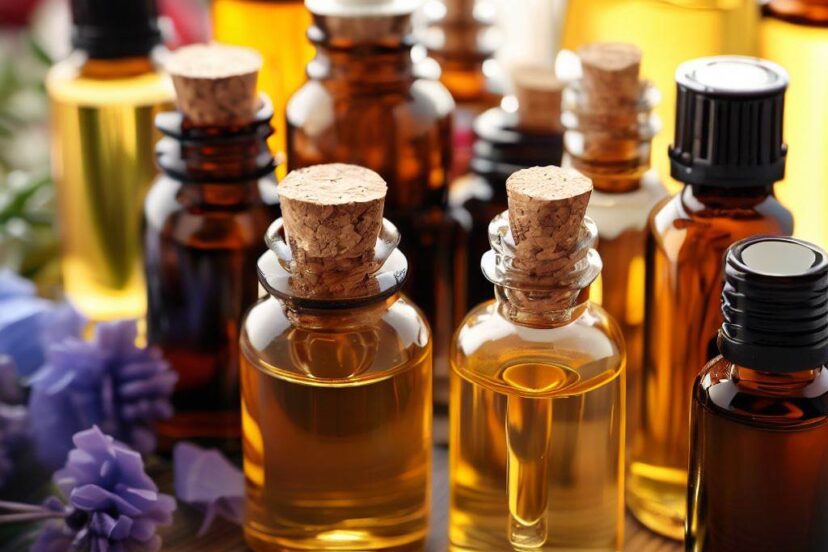Therapeutic Grade Essential Oils: Your Ultimate Guide
*We may earn a commission for purchases made using our links. Please see our disclosure to learn more.
Therapeutic Grade Essential Oils: Unveiling Their Health Benefits
Essential oils have become a staple in natural wellness practices, offering benefits ranging from relaxation to invigoration. Extracted from plants through processes such as steam distillation or cold pressing, these concentrated oils capture the essence of their source, delivering potent therapeutic effects. “Therapeutic grade” is a term that has come to imply a certain level of purity and quality in essential oils, suggesting they are suitable for targeted therapeutic use.
The allure of therapeutic grade essential oils lies in their versatility; they can be used for aromatherapy, topical application when diluted, and in some cases, as dietary supplements. However, the market is saturated with an array of essential oil products, making it crucial to discern quality. Factors like plant source, extraction method, and whether the oil is organic, can vastly impact its properties and efficacy.
When selecting therapeutic grade essential oils, I consider the supplier’s transparency regarding sourcing and testing methods. It’s vital to ensure that these oils are free from additives and contaminants, which could not only diminish their therapeutic qualities but also pose health risks. Additionally, sustainability practices should not be overlooked—the ecological impact of essential oil production is a significant aspect of making an informed choice.
Having spent considerable time investigating essential oils and their applications, I know the importance of choosing the right ones to fit personal health goals and preferences. It’s essential to invest in high-quality oils that will deliver the desired therapeutic benefits, and my focus is to guide you through the nuances of these potent plant extracts. Moving forward, I’ll break down the key factors to look out for, enabling you to choose the best therapeutic grade essential oils with confidence.
Top Therapeutic Grade Essential Oils
I’ve researched extensively and tested a variety of therapeutic grade essential oils to present you with the highest quality options available on the market. My focus has been on purity, potency, and the overall effectiveness of the oils to ensure you have access to the best products for your aromatherapy and holistic health needs. Each of the following picks meets rigorous standards and is backed by positive user feedback, solidifying their reputation in the wellness community.
Zongle Bergamot Oil
I believe your search for a versatile and edible essential oil ends with Zongle’s Bergamot Oil, thanks to its invigorating scent and culinary flexibility.
Pros
- Pleasing, natural citrus aroma that enhances mood
- Edible quality allows for creative culinary uses
- Promotes healthy skin when used topically
Cons
- Potent strength requires careful dilution when applying to skin
- Citrus oils can be photosensitive, limiting daytime use
- Premium quality and benefits come at a higher cost
Having personally experienced the fresh, citrusy scent of this oil, I’m delighted by the immediate ambiance of cleanliness and energy it adds to my home. The aroma is neither too sharp nor too faint—perfect for those mid-week blues or as a sophisticated touch to a dinner party atmosphere. When I diffuse it, the room fills with the unmistakable zesty notes that only pure bergamot can provide.
In the kitchen, a drop of this oil has turned my desserts from simple to gourmet. The ability to safely ingest this oil means it integrates seamlessly into my culinary experiments, providing a subtle, zesty kick. Whether it’s a glaze for a cake or an inventive cocktail, its edible nature truly opens up a world of taste.
Using Zongle’s Bergamot Oil on my skin, I’ve found it to be effective in maintaining its clarity. I mix it with my face wash to harness its purifying properties, and it helps balance my oily skin. As someone who appreciates natural skincare options, incorporating this essential oil into my routine has been beneficial.
Remember that with potent essential oils like bergamot, it’s essential to dilute them properly before topical use, and it’s always recommended to conduct a patch test first. The refined nature of this oil demands respect and attention to detail in its application, but for those who know how to use it, it’s a genuine treasure.
Plant Therapy 7 & 7 Set
If you’re diving into essential oils or refreshing your collection, this versatile set caters to a variety of aromatherapy needs.
Pros
- Offers both single oils and synergy blends, increasing versatility.
- Equipped with comprehensive testing to ensure quality.
- Provides therapeutic benefits at a favorable price point.
Cons
- Some blends may not appeal to everyone’s preferences.
- The 10 mL bottles may run out quickly with frequent use.
- Specific scents may vary in strength and potency.
Recently, I had the chance to experience the Plant Therapy 7 & 7 Essential Oils Set first-hand, and I must say, it’s quite an impressive collection. The set’s versatility is one of its shining features; it includes both single oils and unique blends, adept at addressing a range of needs.
Each of the oils offered a potent aroma that was instantly noticeable upon opening the bottle. Whether I was looking for mental clarity, a bit of relaxation, or even a natural way to support my immune system, I had an oil on hand. Blends like Energy and Relax became fast favorites of mine for their efficacious and immediate effects.
The stringent testing Plant Therapy conducts, including GC-MS reports, gave me confidence in the purity of the oils. Being assured of the therapeutic grade quality made me comfortable using them in home-made skincare products and while practicing aromatherapy.
However, not all the blends aligned with my personal scent preferences, and I found that I gravitated toward some more than others. Additionally, the 10 mL size felt just right for sampling, but for oils I used daily, I noticed the level dropping quicker than anticipated. Lastly, the strength of the scents varied; while some were perfectly balanced, a few were a tad overwhelming, which meant a little went a long way.
Despite these minor concerns, my experience with the Plant Therapy 7 & 7 Set confirmed that it’s a solid choice for anyone looking to integrate essential oils into their wellness routine without breaking the bank. Whether you’re a seasoned pro or new to the world of essential oils, this set brings quality and variety to the table.
Natures-Star Peppermint Oil
I find this peppermint essential oil set offers great value, especially for those seeking a natural method of pest control or looking for aromatic benefits in their home.
Pros
- Prolific quantity that lasts ages
- Versatile for various uses
- Natural option for pest deterrent
Cons
- Scent may not be as concentrated as expected
- Limited to one scent, lacking variety
- Some users may prefer organic products
The moment I unscrewed the cap of the Natures-Star peppermint essential oil, a refreshing scent filled the room. It carries the brisk, cool aroma of mint, which gets me invigorated and alert in the mornings. Its bulk size ensures I’m stocked for a good while, sparing the need for frequent reorders. I also appreciate its multiplicity; a few drops on dryer balls leave laundry smelling crisp and fresh.
On the practical side, my applications extend to pest control; a strategic placement of cotton balls dabbed with this oil had a noticeable effect on discouraging rodents. It’s a non-toxic way to maintain the peace of my household without resorting to harsh chemicals. I’ve found it particularly handy for warding off critters in the basement without disturbing my peace of mind.
In terms of consistency, I noticed it’s a trade-off. The scent isn’t as overpowering as some premium oils, meaning I occasionally need to use more than usual to achieve the desired strength in my diffuser. This could be a plus though, as it prevents the oil from being too obtrusive. Additionally, for those keen on having a medley of aromas, this pack offers only peppermint, which, while delightful, limits sensory variety. Connoisseurs or those seeking certified organic products might find these points worth considering before making a decision.
Edens Garden Sandalwood Oil
I find this Sandalwood essential oil blend from Edens Garden to be a deeply soothing addition to my daily wellness routine, offering a rich, grounding aroma that’s remarkable for relaxation and skincare.
Pros
- Multifaceted aroma combing three types of Sandalwood
- Supports skin health and balances the nervous system
- Company has a strong commitment to quality and purity
Cons
- Higher price point compared to some other brands
- Oil’s viscosity may require removal of the dropper for use
- Scent may dissipate quicker than expected for some users
For me, the rich, meditative scent of this “Around The World” Sandalwood oil has become a cherished part of my evening wind-down. The toasty, musky notes with a hint of sweetness create a sanctuary of calm in my home. I’ve noticed my stress levels diminishing as I breathe in the serene fragrance.
In addition to its therapeutic aroma, I’ve been incorporating a couple of drops into my moisturizer. It seems to enhance my skin’s appearance, making it feel more supple and revived. Given the oil’s undiluted, pure state, a little goes a long way, providing real value despite the investment.
Notably, Edens Garden’s commitment to quality resonates with my preference for responsible sourcing and manufacturing practices. My confidence in this product is bolstered by the brand’s transparency in offering detailed GC/MS reports, assuring me of the oil’s purity and therapeutic grade.
Remember, when selecting an essential oil, it’s crucial to consider your personal needs and preferences. What works wonderfully for one may not satisfy another equally, as experiences with scents can be highly subjective. However, if a warm, woodsy, and authentic Sandalwood aroma that supports well-being aligns with your desires, I believe this offering from Edens Garden could be an excellent choice.
Essences Bulgaria Neroli
If relaxation and natural skin care are your priorities, this organic Neroli essential oil is a worthy addition to your collection.
Pros
- Offers a natural way to alleviate stress and enhance sleep quality.
- Nourishes and softens the skin without synthetic additives.
- Versatile use in DIY projects like bath bombs and homemade perfumes.
Cons
- The scent might be too intense for some users.
- A small bottle size might finish quickly with frequent use.
- Higher price point than some other essential oils.
I recently had the pleasure of using the Essences Bulgaria Organic Neroli Essential Oil in my evening routine. The tranquil fragrance filled my bedroom with a floral and citrus aroma that felt like a personal spa session. I noticed a distinct drop in my stress levels, making it easier to drift off to a restful night’s sleep.
During the day, I used a couple of drops in my carrier oil for a rejuvenating facial massage. The oil absorbed seamlessly, leaving my skin feeling hydrated and replenished. This little wonder also proved itself as a game-changer in my DIY endeavors, lending a luxurious touch to my homemade soap bars.
I was thoroughly impressed by the versatility and efficacy of this essential oil. Although the price is a bit on the higher end, the quality justifies the investment. It should be noted, however, the scent is potent and may not suit everyone’s taste. For the amount you receive, frequent users might find themselves reordering sooner than expected. Overall, my experience with this product was positive, and I can recommend it for anyone willing to splurge a bit for organic quality and effectiveness.
Buying Guide
Understanding Purity
When I choose essential oils, verifying the purity is crucial. Pure essential oils are derived from plants without any synthetic additives. I look for terms like “100% Pure” but I am aware that this is not regulated.
Labels and Certifications:
- Check for authenticity: Look for scientific or Latin names on labels.
- Certifications: Quality oils may have certifications from industry organizations, though not mandatory.
Methods of Extraction
Common Extraction Methods:
- Steam Distillation: Traditional and preserves oil integrity.
- Cold Pressing: Often used for citrus oils, keeping the essence fresh.
I compare methods to ensure I’m getting a product best suited for my purposes.
Concentration and Composition
A high-quality essential oil has a balanced composition that indicates fewer additives or diluting agents. It’s important for me to note:
Plant Part: Different plant parts can produce vastly different oils.
- Leaves: Often lighter scents.
- Roots: Typically richer, deeper fragrances.
Packaging and Storage
Oils should be housed in dark glass bottles to protect from light degradation.
Ideal Packaging Features:
| Feature | Reason |
| Dark glass | Protects from UV light |
| Sealed cap | Prevents oxidation and maintains purity |
Price Points
Price can indicate quality, but I remain cautious:
- Expensive: May signal higher quality, uncommon sources, or slow extraction processes.
- Budget-friendly: I compare with other factors listed to ensure quality isn’t compromised.
I take my time to research and compare these properties before purchasing to ensure I’m investing in high-quality, therapeutic grade essential oils.
Frequently Asked Questions
Essential oils labeled as “therapeutic grade” are reputed for their high quality and purity, offering multiple wellness benefits. I’ll address common queries to help you better understand and use these oils.
1. What are the benefits of using therapeutic grade essential oils?
Therapeutic grade essential oils are used for aromatherapy, promoting relaxation and stress relief. They can also temporarily relieve minor aches and improve mood when diffused or applied topically following proper dilution.
2. How can you tell if an essential oil is truly therapeutic grade?
To ascertain if an essential oil is therapeutic grade, check for a clear label indicating its botanical name, purity, and the method of extraction. A reputable company will provide GC/MS testing results to prove its oil’s quality and purity.
3. What are the safety guidelines for applying therapeutic grade essential oils to the skin?
When applying therapeutic grade essential oils to the skin, always dilute them with a carrier oil to prevent irritation. Perform a patch test to check for allergic reactions, and consult a healthcare provider before use on sensitive skin.
4. Can therapeutic grade essential oils be safely ingested?
Ingesting therapeutic grade essential oils is generally not recommended unless under the guidance of a qualified professional. These oils are highly concentrated and can be toxic if ingested improperly.
5. How does therapeutic grade essential oil differ from food grade essential oil?
Therapeutic grade essential oils are intended for aromatherapy and topical use, while food grade essential oils are approved for flavoring food and beverages. Despite similar purity standards, therapeutic oils should not be assumed safe for ingestion.









